The Quality Sense Conf 2025 brought together thousands of professionals from the tech industry, featuring speakers from Argentina, Bolivia, Brazil, Canada, Chile, Costa Rica, Ecuador, Germany, Mexico, Peru, the United States, Uruguay, and Venezuela.
It was a moment when the community paused to rethink its practices, stepped back from the frenetic use of technology, and focused instead on a more conscious approach to AI, one that prioritizes quality and keeps human beings at the center of every decision.
The fourth edition of the Quality Sense Conf was an invitation to question, reflect, and think deeply about the impact of AI on the software development lifecycle and the evolving role of people, to harness its full potential responsibly and effectively.
Organized by Abstracta, Quality Sense Conf 2025 was held on November 11 at the Radisson Hotel in Montevideo, Uruguay, with nearly 400 people attending in person and more than 3,000 joining virtually. The event brought together leaders and organizations from around the world as sponsors, speakers, and attendees.
There were 24 talks and two keynotes, all delivered in an accessible format with real-time captions, simultaneous translation in Spanish and English, and online streaming for those who could not attend in person. The sessions were organized into four tracks: General, Fintech & Banking, Innovation, and Testing & AI.
“In 2025, we are witnessing a paradigm shift. We have moved from Generative AI to Agentic AI, with agents capable of making decisions to achieve objectives autonomously or semi-autonomously, depending on the level of autonomy we provide,” noted Sofía Palamarchuk, Co-CEO of Abstracta.
In this article, we share everything about the event, revisit the launch of Abstracta Intelligence, the open-source release of Tero, and the most inspiring talks.
Looking for a quality-driven partner to help you innovate effectively? We invite you to explore all our solutions.
A Chronicle of a Day Full of Learning


The positive energy was palpable from the very beginning. Thirty minutes before the official start time, people were already registering in person through the AI Kiosk, a smart totem built by Abstracta in collaboration with Parconier to bring AI agents into the physical world in an innovative way.
The AI Kiosk not only welcomed every in-person attendee but also answered personalized questions about the day’s agenda using natural language.
Federico Toledo, Chief Quality Officer at Abstracta, opened the event with a welcome that set the collaborative and networking-focused spirit that defined the entire day. He invited attendees to talk and connect with unfamiliar faces to spark unexpected and authentic interactions.
“We are building a space defined by technical excellence and two-way learning. Experts from around the world come here to share their experience, and they leave with insights shaped by the work of local specialists,” Federico said.
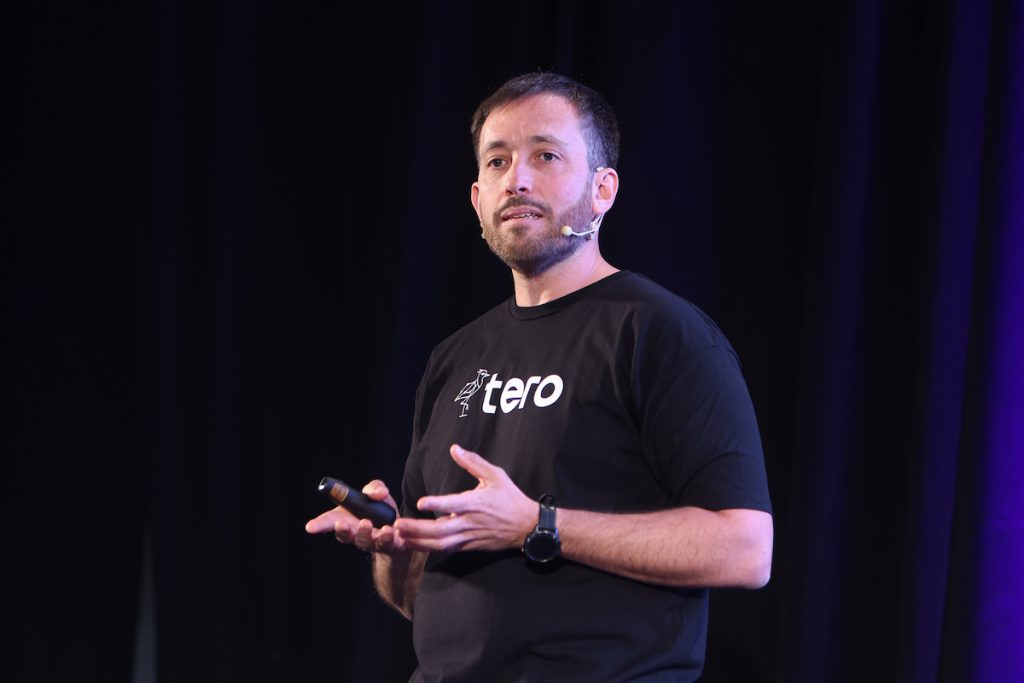

“Quality is the foundation of digital trust. We have worked with hundreds of clients around the world. What has happened during this time, and especially over the past four years, is remarkable, and we chose to play an active role in driving these changes,” he emphasized.
Federico Toledo also announced the free English edition of his book Introduction to Information Systems Testing. You can download it at this link.
A Live Reveal: Real-Time Open-Source Release
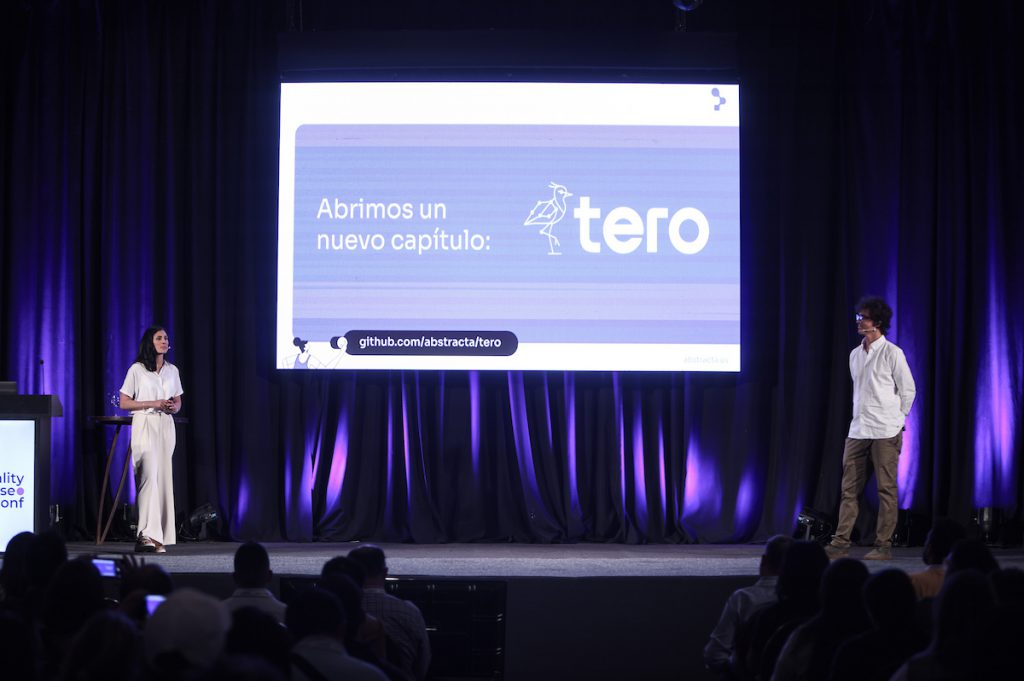

The opening keynote was delivered by Sofía Palamarchuk and Matías Reina, Co-CEOs of Abstracta, who made the event’s major announcement: the launch of Abstracta Intelligence, a human-centered intelligence platform that helps companies close the “Quality Intelligence” gap. This gap reflects the disconnect between what AI produces and what teams need to understand in order to make safe, value-aligned software delivery decisions.
The announcement was filled with emotion as Sofía took a moment to revisit the journey that brought Abstracta to this point and made it possible to deliver such a significant contribution to the industry:
- April 2023: Abstracta’s first internal masterclass on prompt engineering and ChatGPT, led by Sofía and open to everyone in the company.
- May 2023: Our first internal hackathon, a cross-team meetup where people from different areas of Abstracta experimented with using ChatGPT to solve everyday tasks inside the company. Teams presented their ideas and built prototypes for a jury. Many of the concepts explored during the hackathon were later implemented gradually.
“Through all that experimentation, we realized that LLMs, trained on massive datasets, carry biases and issues that persist if we don’t handle them carefully. That’s why we created our own guide for responsible AI adoption and ecological commitment, and we continued to build on it over the years,” she recalled.
- May 2023: Partnership with Microsoft, giving us access to Microsoft’s technology and enabling joint work with the Microsoft AI Co-Innovation Lab, the only one in Latin America and located in Uruguay.
- Mid-2023: Launch of our PrivateGPT platform.
To fully leverage everything we had learned, we needed a secure platform where we could work with confidence. That is why, Sofía explained, our innovation team developed PrivateGPT, a secure platform that provides access to a variety of models and allows teams to share prompts and use them safely across multiple projects.
- October 2023: Development of a copilot for Bantotal, with support from Microsoft. Bantotal is a core banking system used by dozens of banks serving millions of people across Latin America, who access their accounts through Bantotal.
- October 2024: Launch of our platform Abstracta Copilot at the Quality Sense Conf in Colombia. It is an AI-powered platform designed to enhance software testing, developed by Abstracta in collaboration with the Microsoft Co-Innovation Lab. It expanded on what we had already built with the Bantotal copilot and generalized it to support other systems, addressing the evolving needs we were seeing in QA.
After a year full of challenges and learning, 2025 brought the launch of Abstracta Intelligence, with Tero as its open-source platform.
What Sets Abstracta Intelligence Apart
Abstracta Intelligence is a secure platform designed to work with private data, which is why an increasing number of highly regulated environments are leveraging its capabilities. The solution integrates with a company’s existing stack and enables teams to share agents across departments, fostering a far more synergistic and collaborative work experience.
For instance, it connects tools and delivery environments such as Jira, Postman, Playwright, Selenium, CI/CD pipelines, AS/400 and core banking systems, among others, with an AI-enhanced understanding layer (RAG and prompting) combined with the knowledge of development and quality teams.
This helps organizations achieve up to 50% faster debugging, 30% quicker software releases and a 30% increase in team productivity.
“For Abstracta, it’s essential that people continue to play a leading role, because we are the ones who bring critical thinking, empathy and the context needed to make the best decisions,” Sofía emphasized.
Quality Intelligence Gap
Sofía went deeper into the gap between what AI can do and what teams actually need to solve, the Quality Intelligence Gap. “Part of our work this year was not about automating more, but about understanding what we need to test and how it impacts users and the business, because these are things AI cannot answer today.”
“We have been working on the Quality Intelligence Gap since we released Abstracta Copilot. We realized that even though there are agents capable of handling tasks autonomously, humans still play a crucial role because of our understanding of the business, the context and the environment in which the software is being built. All of this is essential to closing the gap,” she emphasized.
Abstracta Intelligence brings these three layers together — systems, context and people — to connect human experience with what AI can perform more efficiently.
Demo at the Quality Sense Conf
After the introduction of Abstracta Intelligence, Matías Reina gave a demo of Tero, our open-source framework that underpins the entire solution.
How do we test software when we don’t have complete documentation? Matías used this common scenario to show how the platform can be leveraged to significantly enhance results.
Tero enables development and quality teams to collaboratively build and use agents, while Abstracta Intelligence expands that foundation by incorporating enterprise copilots, governance frameworks and adoption frameworks that facilitate effective and sustainable integration.
Roger Abelenda, CTO at Abstracta, led the open-source release of Tero. The excitement at the moment of launch is hard to capture in words. The free and open-source release of such a tool is unprecedented in the industry.
To learn more about Abstracta Intelligence and everything it involves, we invite you to read this article.
Parallel Tracks: Innovation on Multiple Fronts
In addition to the welcome session and the keynotes, the event featured four parallel tracks organized by topic and held simultaneously in different rooms on the second and third floors of the Radisson Hotel in Montevideo. Below is a summary of each one.
Track 1#: General
Tero in Action: Build, Safeguard and Accelerate Quality with AI


Roger Abelenda and Anyeelen Cuayatto from Abstracta showed how to work with Tero to build and share AI agents. They walked through several high-impact agents used in the daily workflow for test generation and defect reporting, including integrations with different tools, and explained how this platform can become a strong ally for bringing AI into teams in a secure and collaborative way.
AI Kiosk: The Journey of Bringing AI Agents Into the Physical World
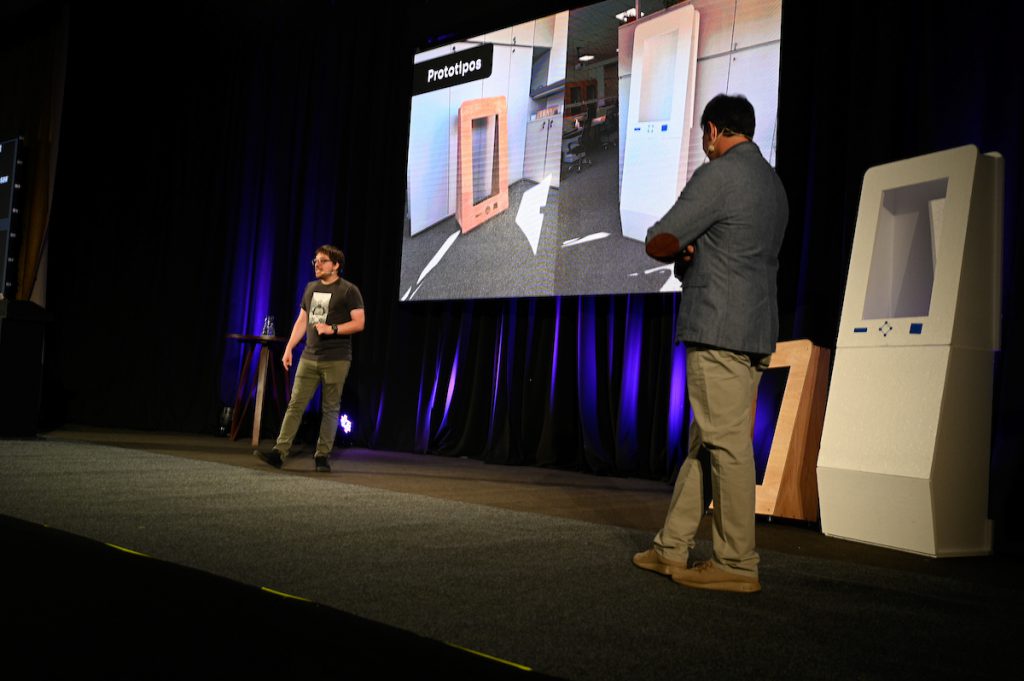

Fabián Baptista (Abstracta) and Pablo Brera (Parconier) shared how they designed and built the AI Kiosk, an interactive AI-powered totem that welcomed attendees in the lobby of the Quality Sense Conf. They explained how they applied test-driven development (TDD) and integrated sensors into a product that combines software and hardware to elevate the way people interact with AI assistants.
Testing Systems with LLMs and Interacting with the Physical World:
Lessons Learned from Building the AI Kiosk
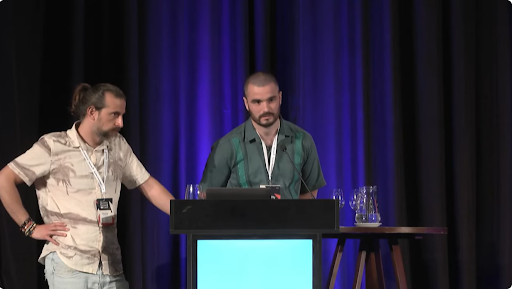

Guillermo Amorín and Sebastián Lorenzo from Abstracta explored the design and implementation of the AI Kiosk from an engineering and robotics perspective, focusing on interaction with the physical world and on testing. They discussed the challenges of testing applications that use LLMs, as well as the complexity of getting software to interact effectively with the real environment.
How to Start a Testing Practice Within an Active Team
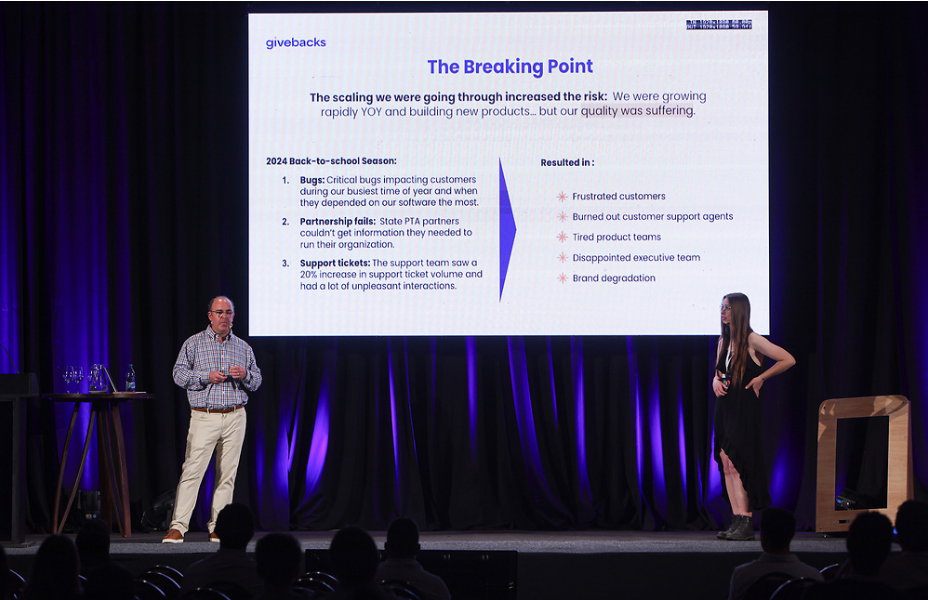

Matt Harrell (Givebacks, North Carolina, United States) and Alexa Altez (Abstracta) shared how they went from having no formal testing at all to building a dedicated team that now covers functional testing, automation, metrics, reporting and a quality mindset that runs across the entire organization. They talked about the challenges of driving a quality culture from scratch and the lessons learned from working side by side to deliver continuous value across multiple areas, with both shift-left and shift-right approaches to testing.
Keeping the Human Touch in the Age of AI and LLMs
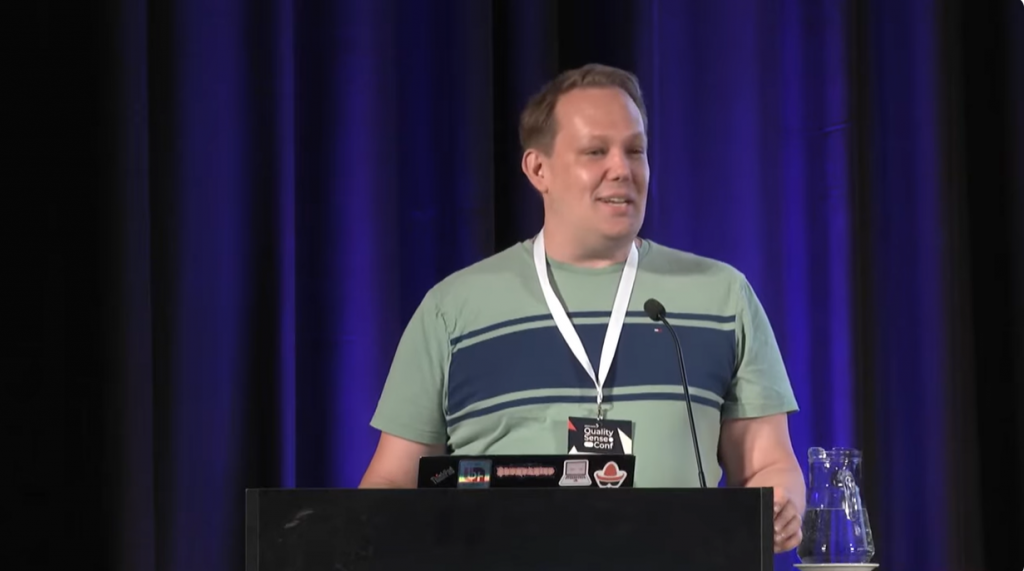

Kyle Siemens (Brightest, Berlin, German) delved into why human collaboration, empathy and — most importantly — critical thinking remain essential even as artificial intelligence automates more and more processes. He discussed how to use AI responsibly while fostering the skills machines cannot replicate, such as creativity, ethical judgment and genuine human connection.
Building Trust Under Pressure:
Rapid QA Transformation for a Regulated Healthcare Client
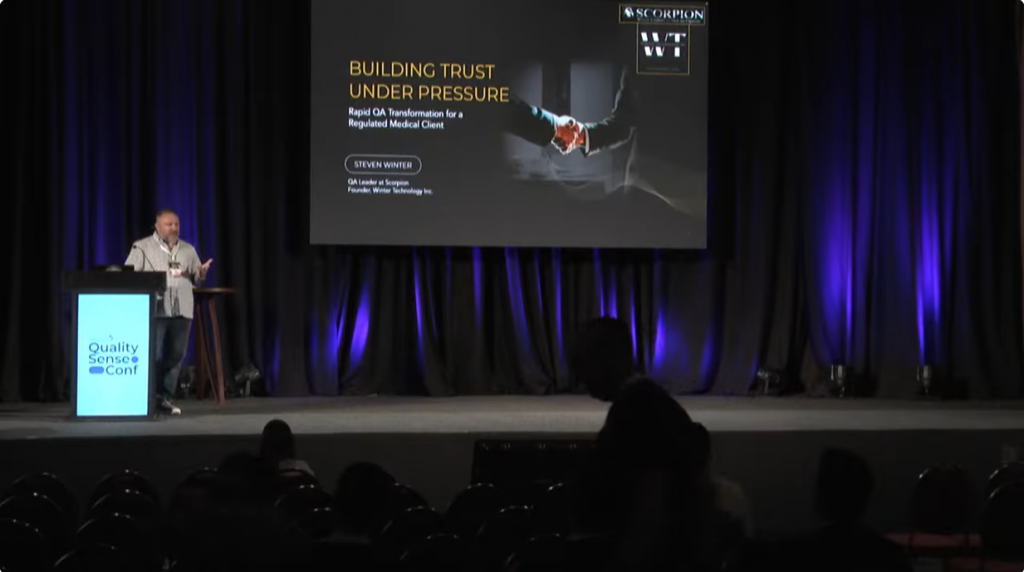

Steven Winter (Scorpion Computer Services, California, United States) shared how, in less than 90 days, he managed to turn around a medical application that was in crisis — under intense pressure and with no documentation — and restore trust across engineering and leadership. In doing so, he offered a practical framework for building a credible, high-value QA program under pressure.
Track 2#: Fintech & Banking
Mocking Works! Microservices Simulation for Banking With SoapUI
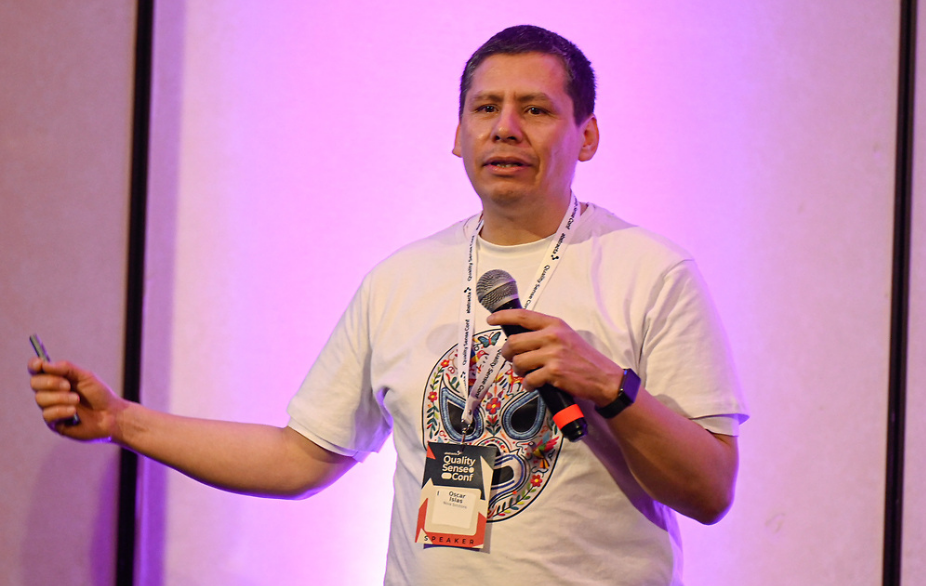

From the banking sector, Oscar Islas (Nova Solutions, Mexico) drew on his more than ten years as an analyst in the Mexican banking industry to present his approach. He explained how, through an iterative process, he implemented a low-cost, high-impact solution using a proxy, the versatility of the Groovy language, and the hidden potential of a classic tool like SoapUI to build a custom virtualization framework.
Observability to Manage the Quality of Systems in Production
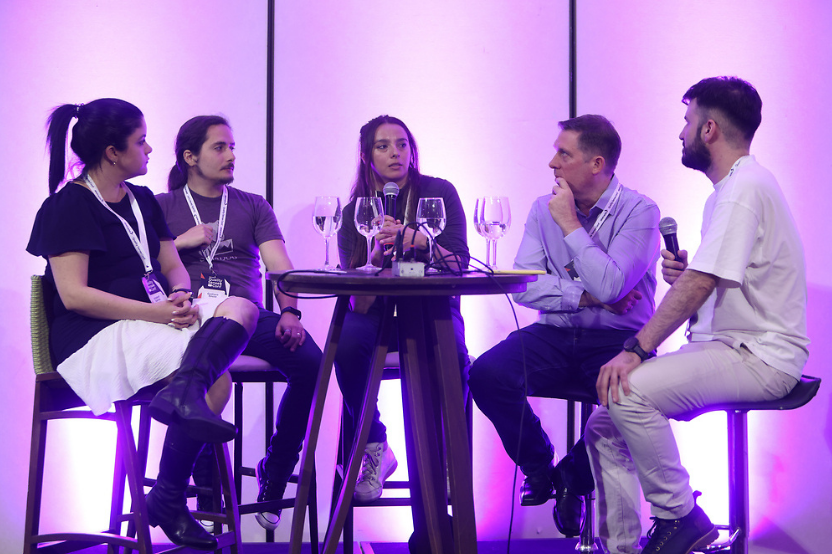

Andrei Guchin (Abstracta) interviewed Anisbert Suarez (PedidosYa), Karime Salomón (IDT Corporation), Gustavo Mazeikis (IMM) and Gustavo Sousa (Datadog) to understand how observability is experienced and implemented in different contexts. The panel highlighted some of the most relevant insights from the latest edition of WOPR Latam, held in November in Uruguay, and emphasized the challenges and opportunities that emerged when applying observability in real-world scenarios.
From Putting Out Fires to Creating Value: How to Align Business and Technology in Banking
Gabriel Montero (Peregrinus, Uruguay) Gabriel Montero (Peregrinus, Uruguay) encouraged the audience to reflect on the importance of shifting from urgency to awareness and from apparent productivity to real productivity. He proposed leadership and quality practices that align business and technology by using AI consciously, enabling automation and simplification without creating additional debt and waste.
Observing Quality: Observability-Driven Testing in Financial Systems
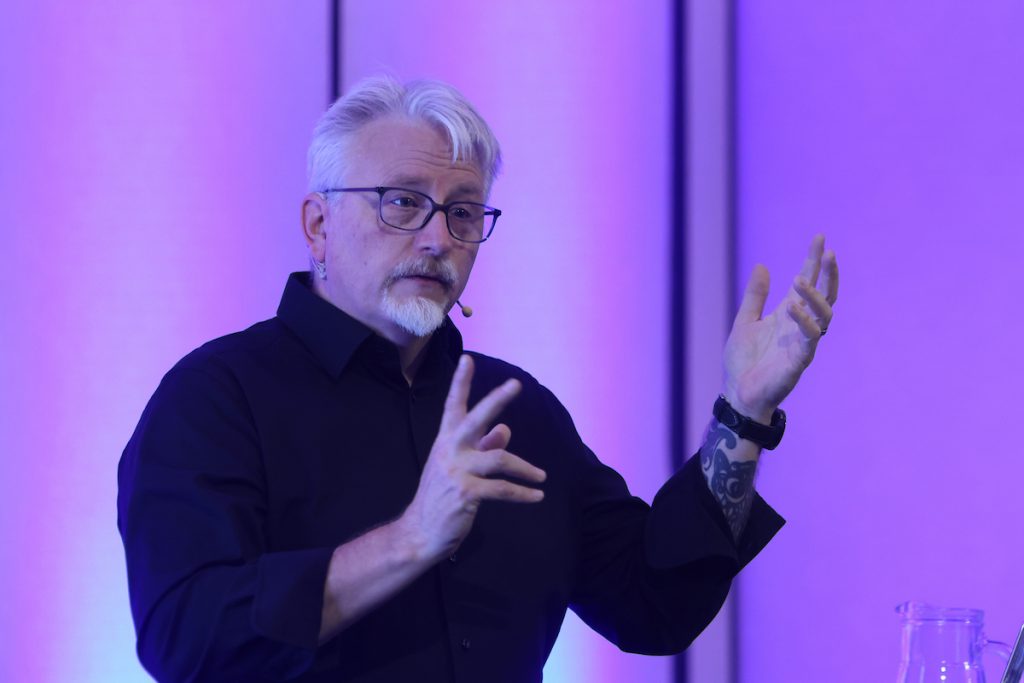

Mark Tomlinson (Performacology, Pennsylvania, United States) outlined his work at FreedomPay and how the team has improved test automation for payment-transaction anomalies and exception tracing across code and systems. He also offered practical tips on how to get started, best practices, the business value of AI in testing and automation, and more.
From Automation to Collaboration: A Copilot for Banking
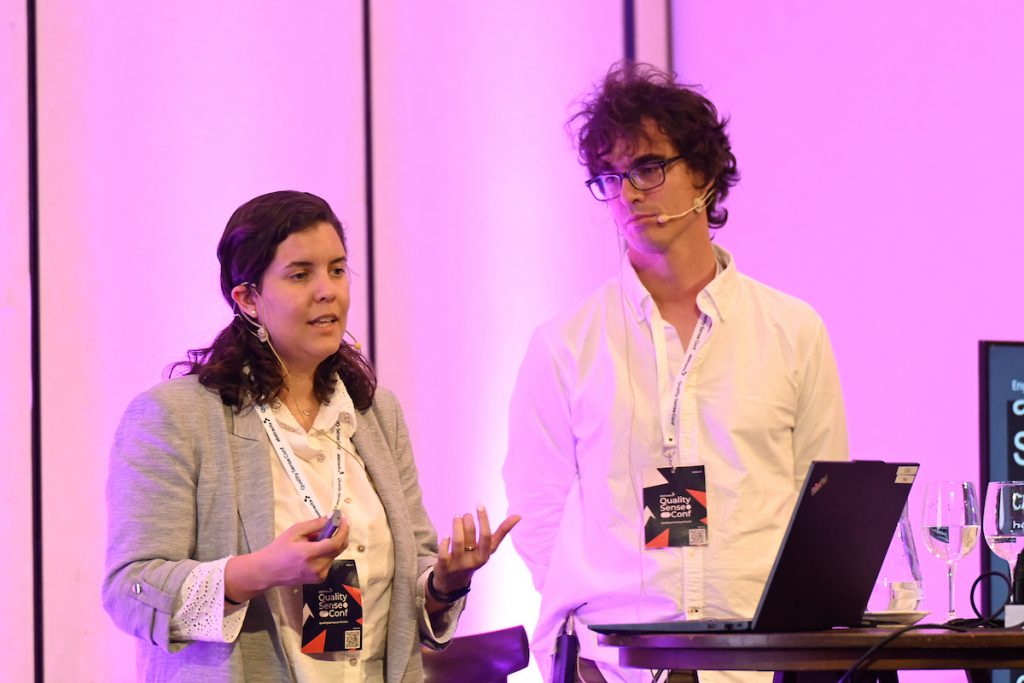

Matías Reina (Abstracta) y Noelia de los Santos (Bantotal, Uruguay) discussed the complex reality the financial sector faces today, shaped by strict regulations and constant pressure to innovate without compromising stability. They explained how intelligent collaboration across teams becomes a true catalyst for change. They highlighted how a specialized copilot for core banking can become a strategic ally for navigating the complexity of financial systems.
AI in Action: Turning Prompts In
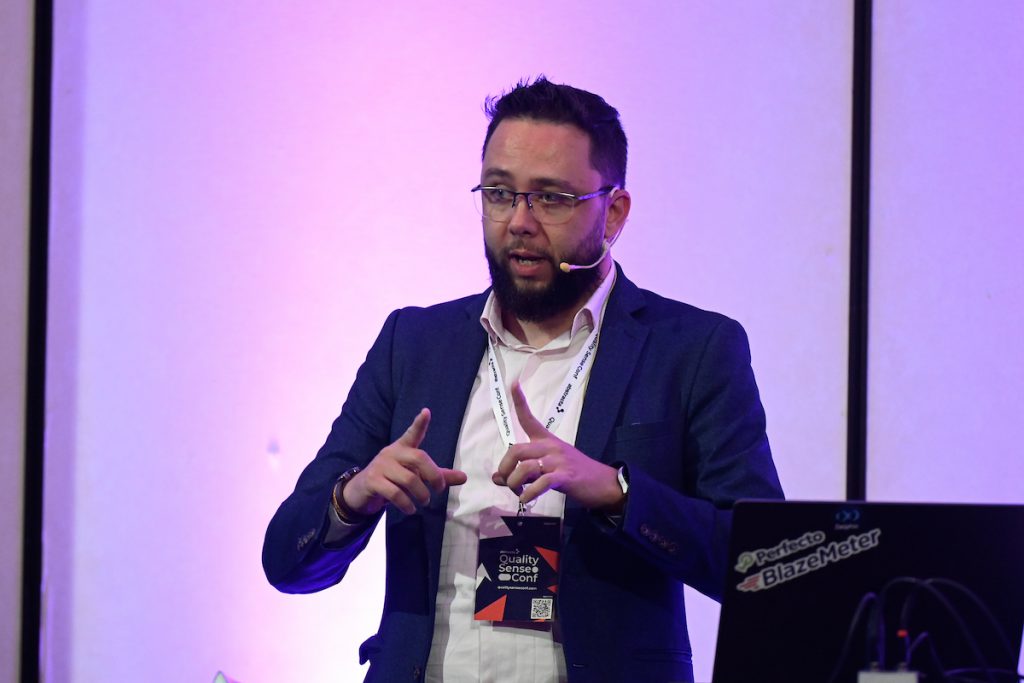

Tiago Soares (Perforce, Brazil) focused on showing how Artificial Intelligence is transforming software quality by enabling the creation and execution of tests directly from natural-language prompts, without writing a single line of code. He presented real testing outcomes achieved through this approach, analyzed their impact on efficiency and coverage, and discussed why these capabilities are increasingly important for the future—especially in highly regulated environments.
Track 3#: Innovation
From Bugs to Burnout: Quality-of-Life Lessons for QA and Tech Leaders


Thiago Castor (Double IT, Brazil) offered a different perspective on burnout in QA and leadership teams, not as an individual failure, but as a systemic bug that emerges from constant pressure, impossible deadlines and a culture of blame. Through practical tools and real cases, he explored how to redesign quality so that it not only protects the product but also the people who build it.
How to Develop Software With Speed and Quality in Banking and Fintech Environments
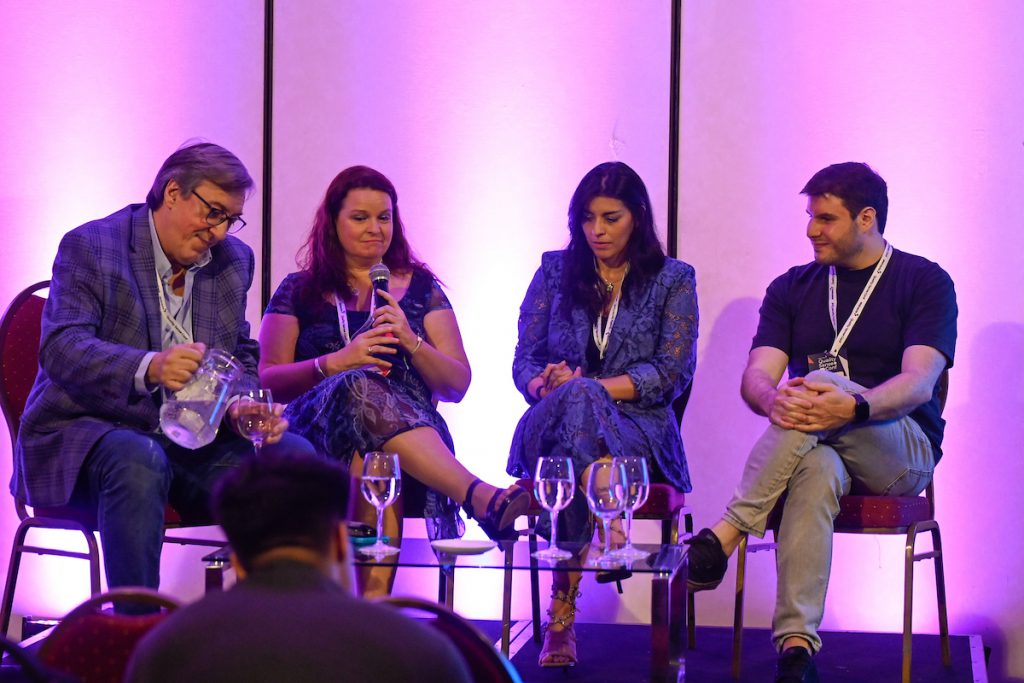

In this panel, Amílcar Perea (CUTI, Uruguay) Fernanda Aizcorbe (Abstracta), Martín Barreto (BigCheese, Uruguay) and Mercedes Quintero (Qualitas, Colombia) discussed how to achieve both speed and quality efficiently and sustainably in the financial industry. They exchanged ideas on strategies to accelerate development cycles without compromising security or stability, how to scale DevOps and testing practices, the role of automation, AI and quality engineering, and the challenges of operating in hybrid environments that combine legacy and cloud systems.
How to Sell Testing Solutions and Lead Change
Julio César Oropeza (TransUnion, Costa Rica), Claudia Badell (QAdrive), Matías Fornara (Abstracta) and Mercedes Remedi (Tandem, Uruguay), as moderator, brought a dynamic discussion on how to turn quality ideas into real, actionable outcomes. They talked about identifying the root causes of problems, communicating and “selling” quality proposals effectively, building alliances across different levels of the organization, and sustaining change beyond the initial agreements.
Redefining the Role of Testers and Business Analysts in the Age of AI
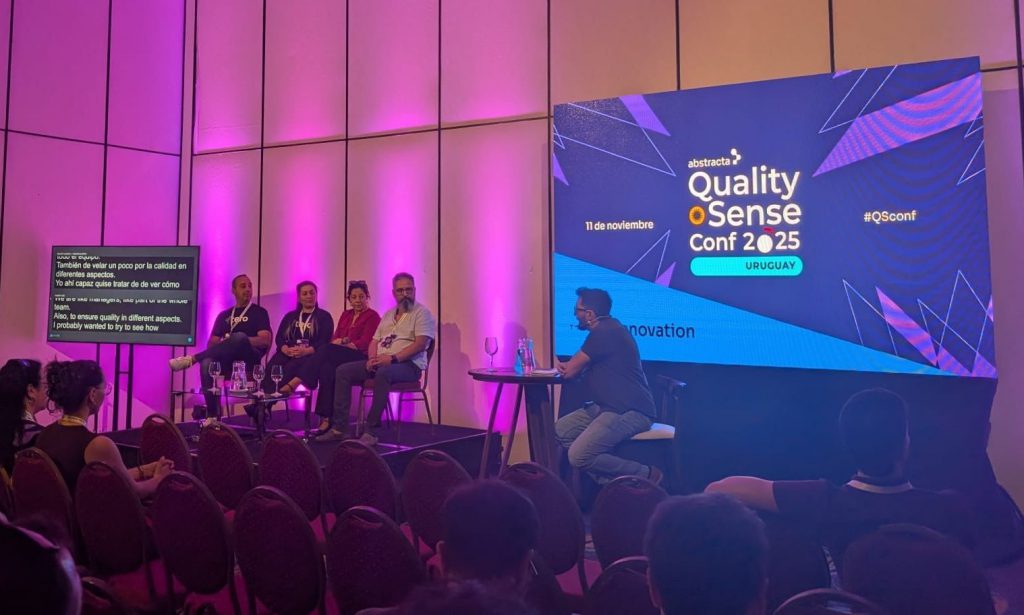

In this panel, Arcadio Abad Márquez, as moderator (Abstracta), Anyeelen Cuayatto (Abstracta), Inge Eichhorns (Akzio, Chile), Luis González (Abstracta), and Pablo Demarque (ANEP, Uruguay) discussed how the rise of artificial intelligence is radically transforming the way software quality is designed and achieved. They invited the audience to rethink professional identity, delved into how the roles of testers and analysts are evolving, and explored the responsibilities that are undergoing significant change.
From Experimentation to Impact: How to Deploy AI With Purpose in Your Organization


Vera Babat, as moderator (Abstracta), Fabián Baptista (Abstracta), Jeunisse Danae Calle Medina (BCP, Perú), Karime Salomón (IDT Corporation, Bolivia) and Natalia Nario (QAlified, Uruguay) posed a key question: how do we move from isolated experimentation to real impact within organizations?
They shared their experiences adopting artificial intelligence and delved into how to connect AI integration efforts with the purpose of both individuals and organizations, building more resilient networks along the way.
New Business Models in Tech Services Companies in the Age of AI
Marcel Mordezki (ORT, Uruguay) delved into how artificial intelligence is transforming business models in the tech services industry, as well as the organization of work and the creation of value. He analyzed how the automation of programming, testing and traditional development tasks puts pressure on the classic software factory model while also opening space for new dynamics. He also discussed several emerging models.
Track 3#: Testing & AI
How to Test the Unpredictable: QA’s New Challenge in the Age of AI
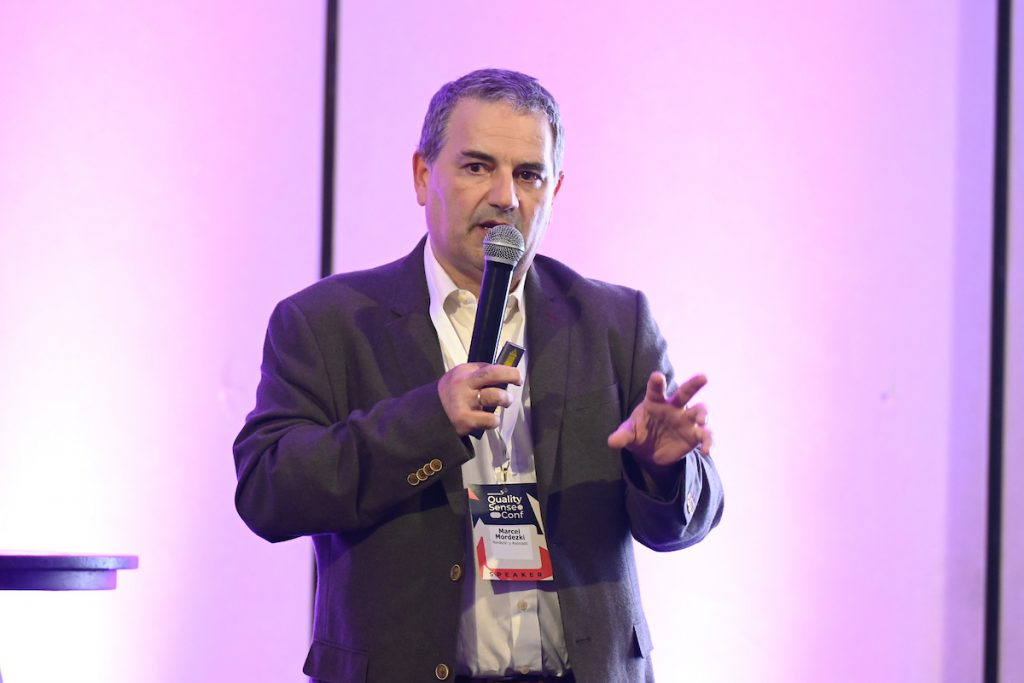

Marcel Mordezki (ORT, Uruguay) delved into how artificial intelligence is transforming business models in the tech services industry, as well as the organization of work and the creation of value. He analyzed how the automation of programming, testing and traditional development tasks puts pressure on the classic software factory model while also opening space for new dynamics. He also discussed several emerging models.
Track 4#: Testing & AI
How to Test the Unpredictable: QA’s New Challenge in the Age of AI
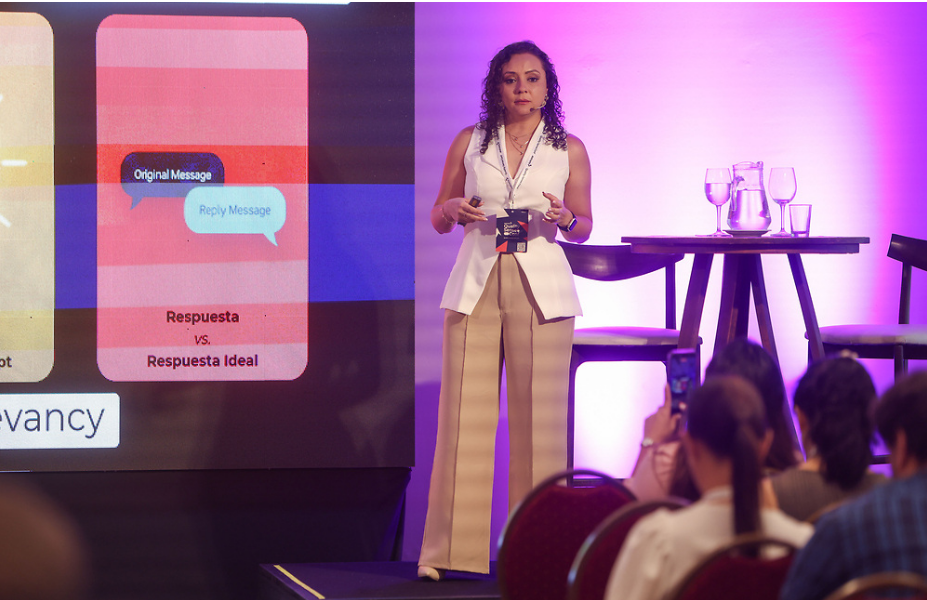

Alexandra Zamora, (Digital Loop, Ecuador) analyzed the challenges of testing generative AI models, where there are no single correct answers. She showed how the QA role evolves when working with generative systems, presenting real strategies such as using validation datasets for controlled testing and automating validations with semantic criteria. She also reviewed why metrics like faithfulness, answer relevancy and semantic similarity are key to achieving quality in generative AI products.
Automating Generative AI Testing: Here’s How to Make It Happen


Renzo Parente (Abstracta) focused on the challenge of testing systems whose outputs change on each execution, in a context where LLMs are becoming part of real products. He gave demos of open-source tools such as Promptfoo to test LLM-based systems and build pipelines capable of adapting to dynamic, variable responses. He shared how to design effective tests tailored to non-deterministic outputs, integrating AI into testing processes.
Quality-Driven AI: Benchmarks and Traditional Testing for Generative AI Agents
Damián Pereira (Endava, Uruguay) showed how to design a testing strategy for generative AI agents, drawing on his experience building and validating the API Automation Agent, an open-source tool that autonomously generates complete automation suites based on OpenAPI specifications and Postman collections. He walked through its architecture, the challenges of dynamic code generation and a live demo that intentionally failed to highlight its limits.
Your Backlog Speaks, Your IDE Listens: How to Test (and More) with MCP in Control
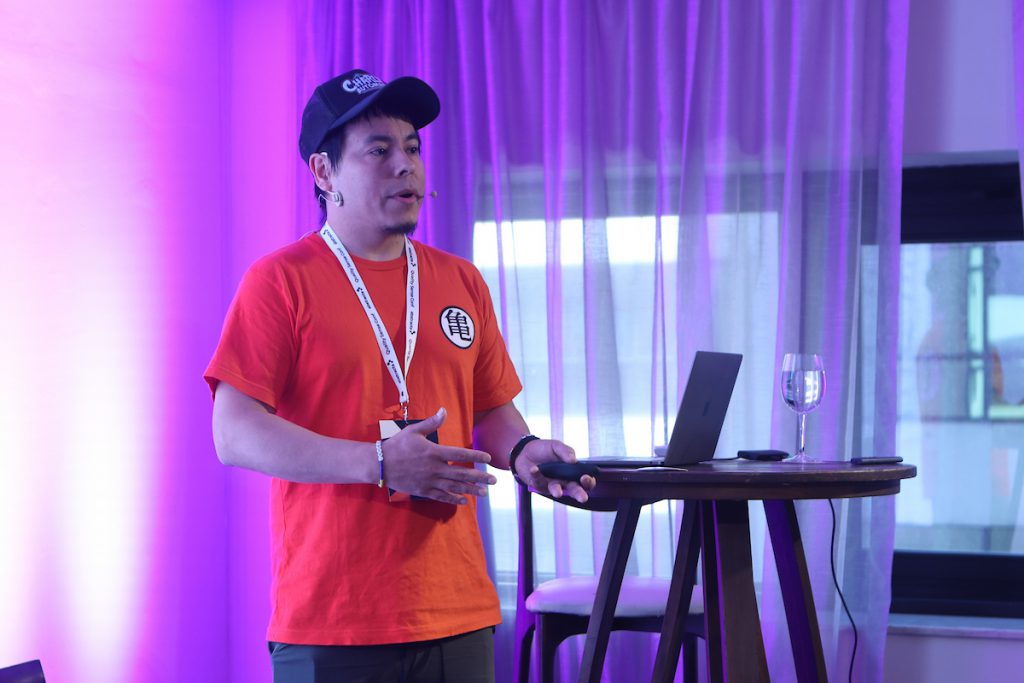

Charly Gauto (Mercadolibre, Argentina) posed a series of questions to the audience: “What if the backlog could speak? What if your IDE could understand context, write tests, suggest edge cases, and help you test software without losing focus?” He demonstrated how to automate testing with an AI-First approach using Playwright and GitHub MCP Servers, orchestrated by real IDEs and powered by pre-prompting rules.
Test Management: From Spreadsheets to Intelligent End-to-End Management
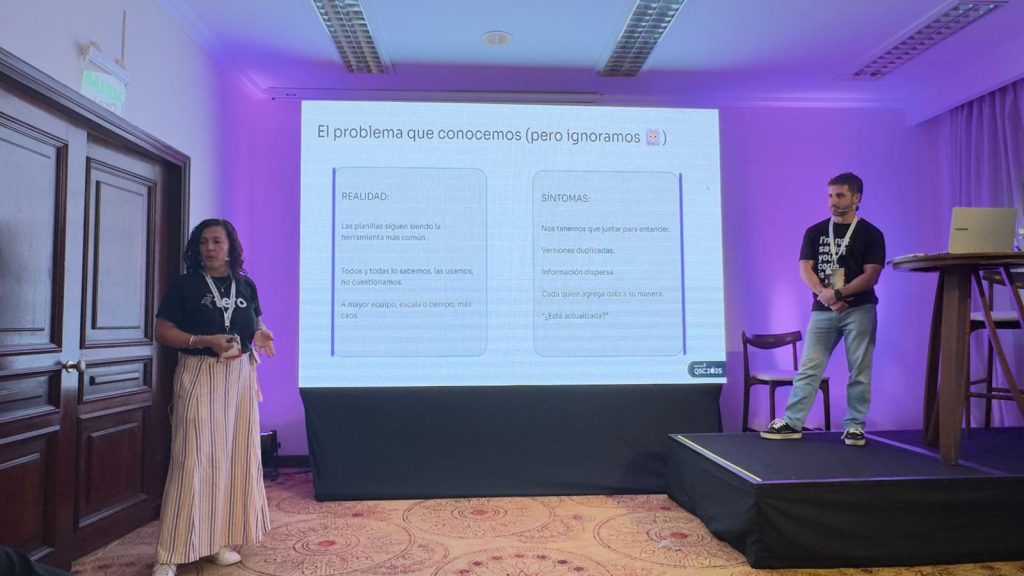

Alejandra Viglietti and Federico Martínez from Abstracta addressed a key issue in the industry: how test management still depends on spreadsheets that are cumbersome, not very collaborative, and difficult to maintain, even in a constantly evolving technological landscape. As a response to this problem, they showed how specialized, AI-powered tools improve visibility, efficiency, and quality.
Enhancing Accessibility in the Development Lifecycle Through Artificial Intelligence
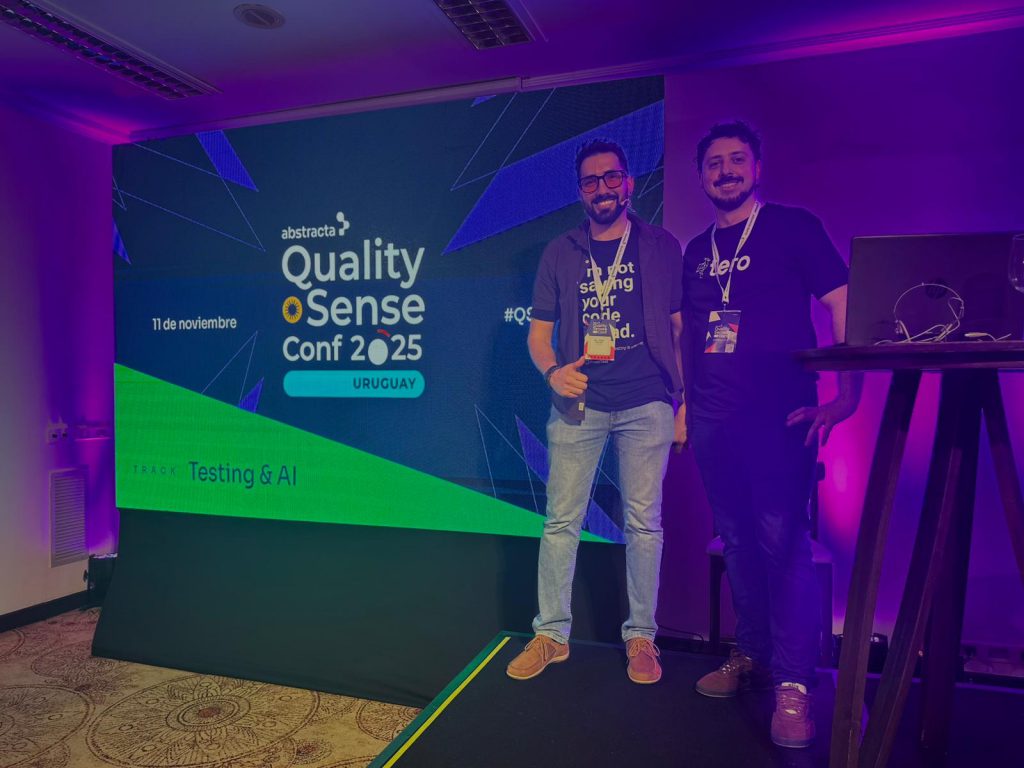

Arcadio Abad Márquez and Renzo Parente from Abstracta spoke about software accessibility as a crucial aspect of software development. They went deeper into the importance of integrating AI into the development lifecycle to improve application accessibility with a shift left approach, aiming to make it more efficient and less costly. They showed how AI can help verify WCAG criteria and become a strong ally in creating inclusive digital experiences.
Ending the Day on a High Note
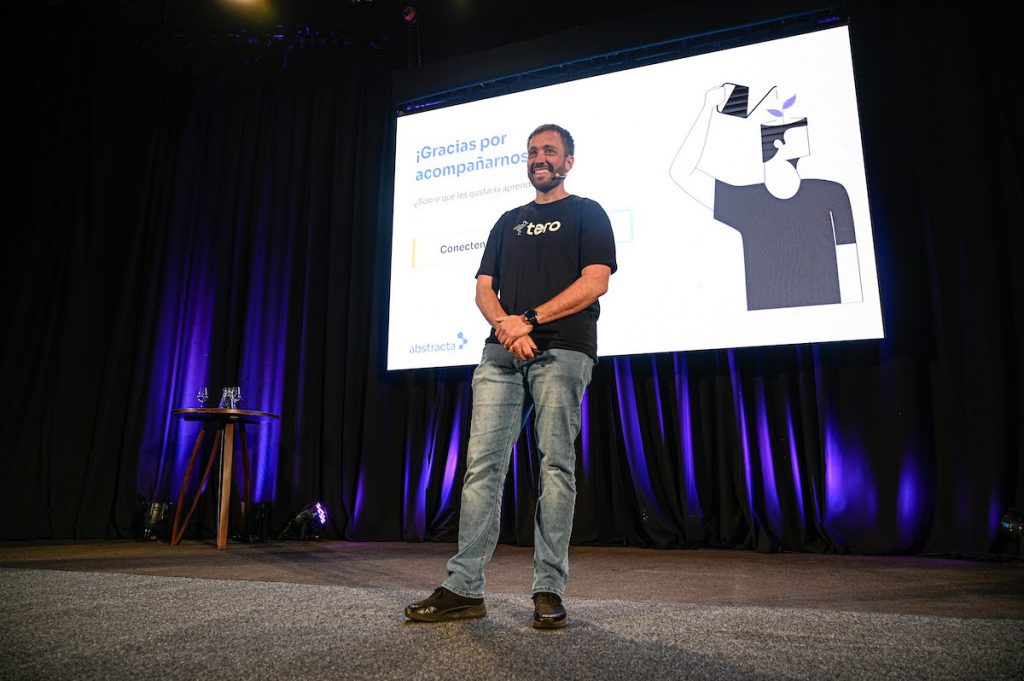

Few conference days run this long and still keep the room full until the very last minute, but this one did. Federico Toledo delivered the closing talk.
“We have always worked in an environment of uncertainty in IT, but now with Artificial Intelligence, that uncertainty is intensifying,” he said. He then focused on five current challenges:
1. Hype vs. Reality: The gap between promised AI solutions and the results actually achieved, which creates frustration and pressure.
Federico spoke about the importance of adopting AI responsibly and collaboratively to maximize the chances of successfully integrating it into daily workflows. “If we don’t adopt it responsibly, we face all kinds of damage and losses — time, money, hidden costs, frustration from unmet promises and more.”
2. Limited Adoption: Cultural resistance and lack of clarity. A sense of running behind, which creates discomfort.
“Even though technology evolves exponentially, companies do not adopt it at the same pace. It’s important to adopt it, but to do so consciously. The change needs to be gradual, strategic and supported by visibility into the small wins.”
3. Obsession with Saving Hours: The hidden cost of speed
“It often feels like we need to increase productivity without even knowing why. Many times, we confuse being busy with being productive. And if we have a small gap in our schedule, we fill it with more tasks instead of pausing to think, something we actually need in order to adopt AI more effectively. We cannot lose sight of the fact that quality is a marathon. It is long-term, and we need to manage our energy accordingly.”
4. Lack of Foundations: Core Principles at Risk
At this point, Federico used a report to explain the risks that come with not having a shared definition of what productivity actually means. This carries significant danger because, for example, producing more code can lead to serious issues in production if it’s code we do not trust.
“That apparent speed ends up hurting real productivity. It is important to adopt AI, but to do so in the right way,” he noted.
5. Isolated Efforts: Working in Silos
In this final point, Federico highlighted the importance of avoiding individual work on challenges that are often shared across multiple teams. Instead, he emphasized the value of building on existing work to achieve stronger results.
One example is test-case agents: it is often far more effective to adapt an existing agent that already works and tailor it to the needs of another project than to start building a new one from scratch.
“With that vision in mind, we created Tero and released it as open source. We see it as an open lab for the community. It started as an open lab inside the company, but now we can expand it at the community level to connect learnings. The platform already includes ten agents, and the idea is not only for people to use them but also to improve them and contribute back to the community.”
After sharing multiple examples and practical tips for leaders (we highly recommend watching the full talk on our Youtube channel), Federico closed his session by reinforcing the importance of working with a collaborative mindset and sharing knowledge to maximize the chances of success in the responsible adoption of AI.
How We Can Help You
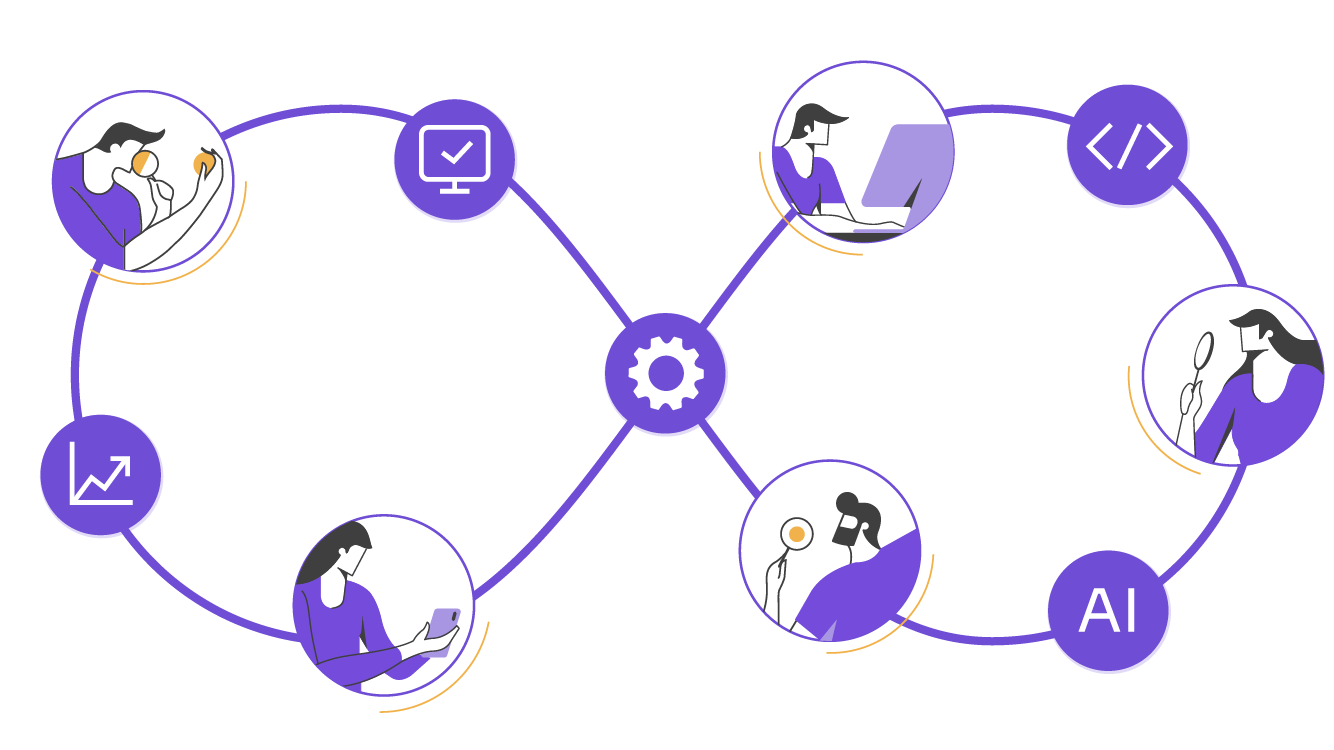

Founded in Uruguay in 2008, Abstracta is a global leader in software quality engineering and AI transformation. We have offices in the United States, Canada, the United Kingdom, Chile, Uruguay, and Colombia, and we empower enterprises to build quality software faster and smarter. We specialize in AI-driven innovation and end-to-end software testing services.
We believe that actively bonding ties propels us further and helps us enhance our clients’ software. That’s why we’ve forged robust partnerships with industry leaders like Microsoft, Datadog, Tricentis, Perforce BlazeMeter, Sauce Labs, and PractiTest.
We invite you to learn about all our solutions on our website.


Follow us on Linkedin & X to be part of our community!
Recommended for You
Introducing Abstracta Intelligence: Our New AI-Powered Delivery Platform
Quality Sense Conf 2024: Shaping the Future of Software Quality in Latin America
Tags In
Natalie Rodgers, Content Manager at Abstracta
Related Posts
New Partnership Between Abstracta and PractiTest to Strengthen Test Management in Latin America
We’ve joined forces with PractiTest to bring you one of the top test management tools, backed by Abstracta’s support. We’re excited to announce a new strategic partnership with PractiTest, one of the most comprehensive and up-to-date test management platforms on the market. After evaluating several…
International Expansion: Abstracta Lands in Brazil
International Expansion: Abstracta Lands in Brazil
Leave a Reply Cancel reply
Search
Contents
Categories
- Acceptance testing
- Accessibility Testing
- AI
- API Testing
- Development
- DevOps
- Fintech
- Functional Software Testing
- Healthtech
- Mobile Testing
- Observability Testing
- Partners
- Performance Testing
- Press
- Quallity Engineering
- Security Testing
- Software Quality
- Software Testing
- Test Automation
- Testing Strategy
- Testing Tools
- Work Culture





